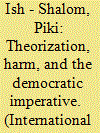| Srl | Item |
| 1 |
ID:
115222


|
|
|
|
|
| Publication |
2012.
|
| Summary/Abstract |
This article joins a growing chorus of voices aiming to decolonize International Relations (IR). It argues that the location of Latin America is ideally placed to bring a significant critique of IR because of its intimate relationship to one of the conventional IR's key protagonists: the USA. The analysis involves thinking about the USA from a historical and theoretical position in Latin America, exploring the always intimate relationship between the two. It draws its inspiration particularly from Latin American theorization of the "coloniality of power" and explores two decolonial strategies: thinking about the emergence of a globally powerful USA through coloniality theorizing and examining the political possibilities of "border thinking" and "diversality" within the "colonial difference" for a decolonial IR. The article seeks to open a field of discussion which positions Latin America as a site for critical thinking and action, and a heartland of decolonial struggle.
|
|
|
|
|
|
|
|
|
|
|
|
|
|
|
|
| 2 |
ID:
153597


|
|
|
|
|
| Summary/Abstract |
All nationalist movements make use of a variety of aspects (language, history, race, etc.) of the territory claimed as a nation to build their discourse on said nation, and, though these discourses are often presented as something permanent and unchanging over time, they can change depending on the historical context. This is indicated by the Basque nationalist movement's two main discourses on the nation, as well as by what appears to be a tendency towards a new discourse currently being developed within this movement. The new discourse seems to have adopted the concept of democracy as a key element in its theorization.
|
|
|
|
|
|
|
|
|
|
|
|
|
|
|
|
| 3 |
ID:
085572


|
|
|
|
|
| Publication |
2008.
|
| Summary/Abstract |
The migration of democratic-peace theory from academia to the American political arena resulted in misrepresenting the theory politically. Both the form and content of the political misrepresentation are different from those of the theory. It is argued here that rather, than the theory itself, it is its political misrepresentation that influenced public deliberation and the recent American efforts to democratize the Middle East. Thus, the inputs of theorizing the democratic peace are shown to cause political harms and policy mishaps. Identifying the harms, the mishaps and the theoreticians' indirect responsibilities for them, I conclude that theoreticians are ascribed with political responsibility ensuing in a democratic imperative to show greater concern and involvement in the political destinies of their theories and to participate more actively in the public deliberations that shape policies
|
|
|
|
|
|
|
|
|
|
|
|
|
|
|
|